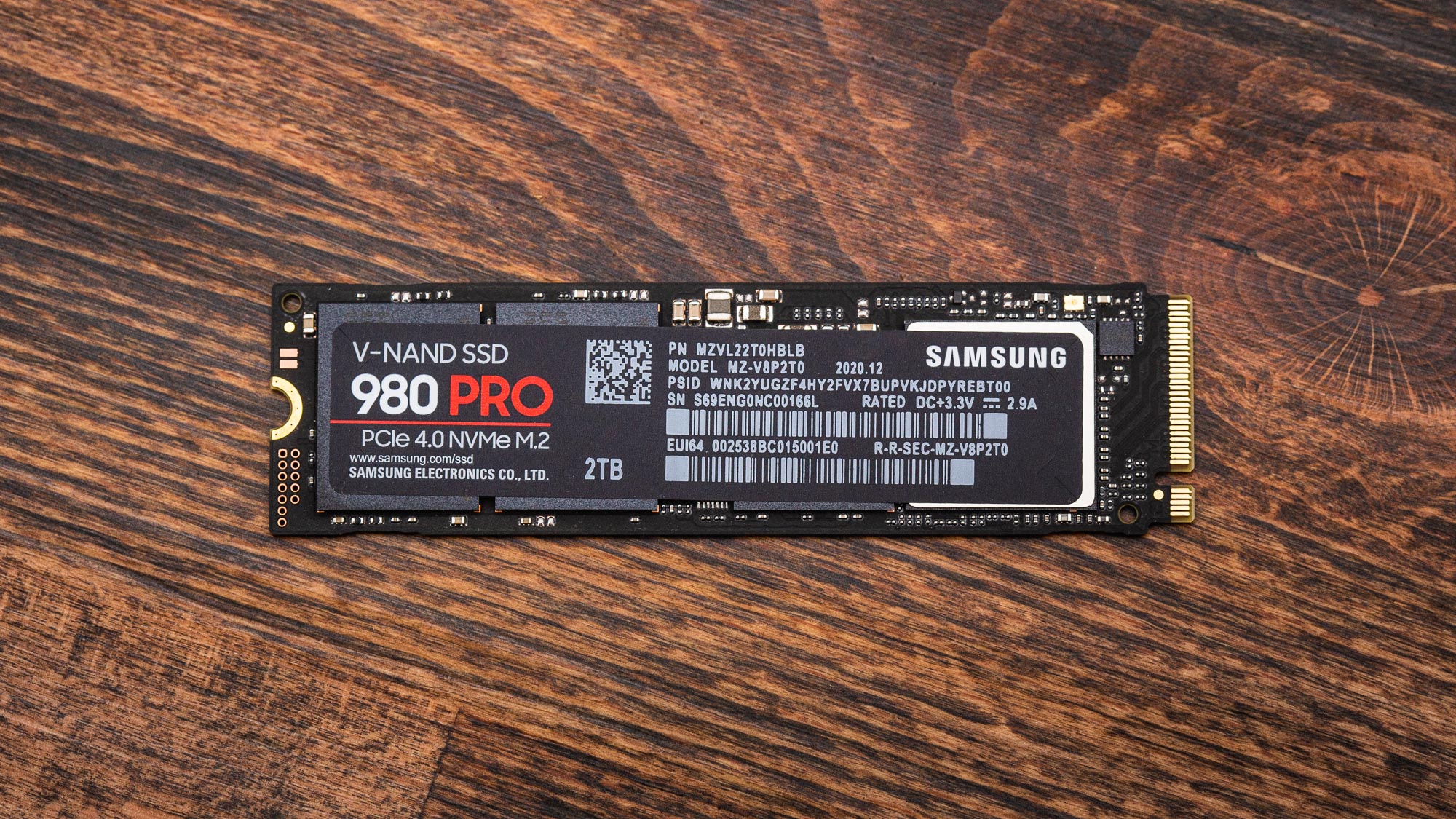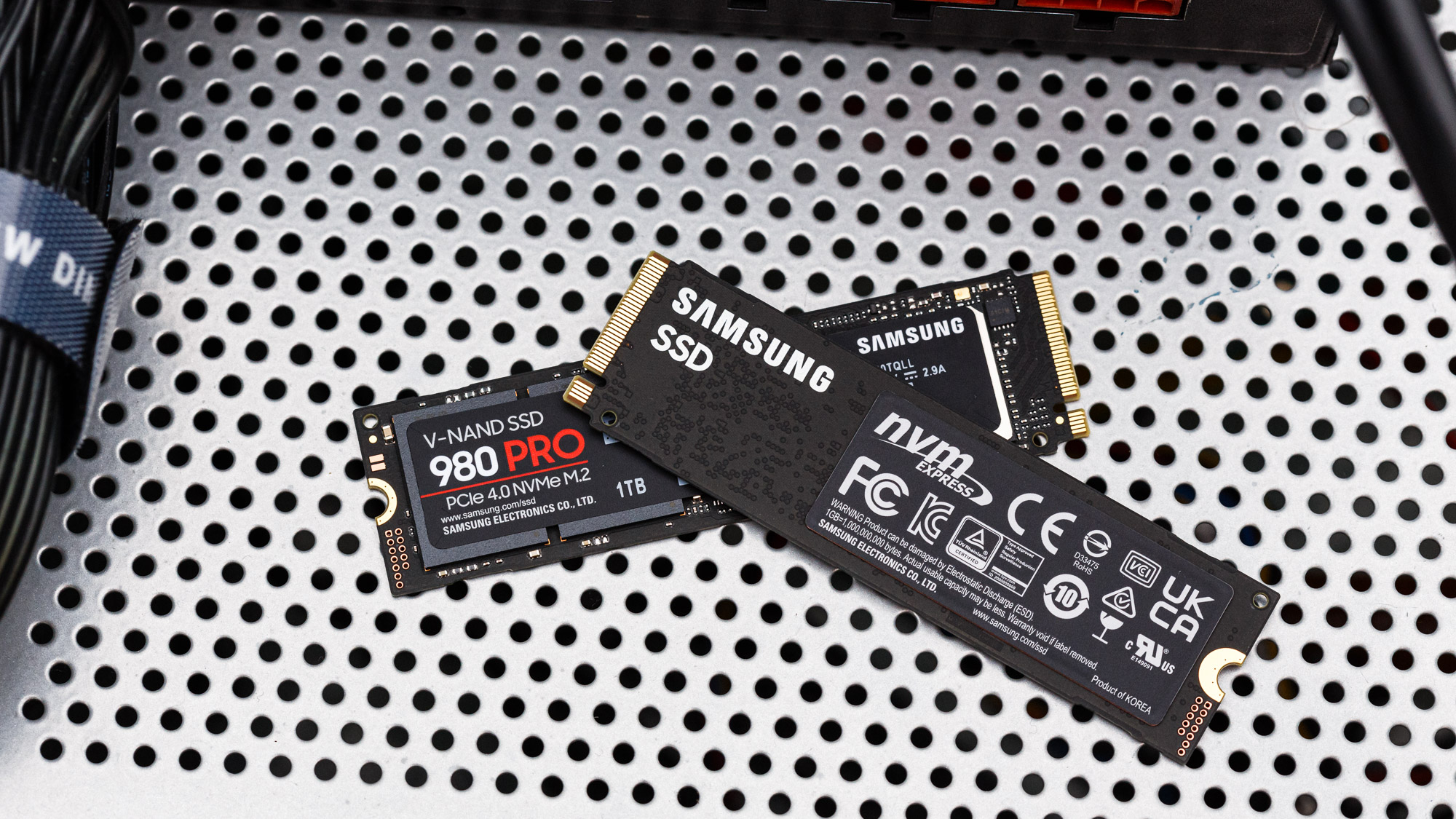Why you can trust Tom's Hardware
Samsung's new SSDs tend to bring best-of-breed performance that dominates the market, and the 980 Pro is no exception – after a long wait for the company's first PCIe 4.0 SSD, the 980 Pro redefines high-end SSD storage. The company's new and powerful Gen4 Elpis NVMe SSD controller, built from the ground up to pair with its newly refined V-NAND, propels the Samsung 980 Pro to the upper echelons of the SSD market. This devastating combo delivers up to 7/5 GBps of sequential read/write throughput and upwards of 1 million IOPS across the PCIe 4.0 bus.
However, the Samsung 980 Pro doesn't go without rivalry or fault. Both Intel's Optane SSD 905P and Samsung's older 970 Pro can write at a faster rate for longer periods of time. Samsung does have a hidden strength in sustained workloads, though. The company strove to find the right balance to make the 980 Pro the best overall drive for prosumers, and that entailed ensuring the drive would provide leading performance after the TurboWrite cache is entirely full. In contrast, competing SSDs powered by Silicon Motion's SM2262EN controller, and even PCIe 4.0 SSDs sporting Phison's E16 NVMe SSD controller, suffer from reduced performance after the cache is full. Those controllers also aren't as efficient.
Phison's leaned heavily on an existing design for its hastily-built E16 SSD controller, so there wasn't much innovation beyond the faster-than-PCIe 3.0 sequential performance. While the company scaled sequential speeds and improved performance in random workloads slightly, the E16 lagged PCIe 3.0 competitors in some areas.
That's why Samsung tuned the 980 Pro for fast sequential performance both with and without TurboWrite. The 960 Pro also offers incredible random read performance: We hit 22K IOPS at a QD of 1. The 980 Pro also delivers among the fastest response times we've seen from a flash-based SSD (Intel's Optane is another story, though).
SSD makers try to balance a few key features, like price, capacity, performance, and warranty. When it comes to storage, long warranties convey high quality, and premium pricing emphasizes it more. With an emphasis on quality over cost, Samsung's Pro series SSDs built the company's reputation over the years with a premium pricing strategy, which worked very well.
The 980 Pro marks a shift in the company's pricing strategy, though. Samsung didn't focused on being 'just' the best in terms of features or performance, it is also focused on price this time, too. The new focus on more competitive pricing for its Pro series also suggests we'll see its entire portfolio shift into more cost-competitive positions, too.
At the time of launch, the 1TB 980 Pro costs just $229.99, which is much less expensive than its predecessor. That's still quite a premium over the more cost-effective Adata XPG SX8200 Pro or SK hynix Gold P31. However, it's also $120 cheaper than the previous-gen 1TB 970, and only slightly more expensive than any Phison E16-based SSD.
Get Tom's Hardware's best news and in-depth reviews, straight to your inbox.
We also don't see the long 10-year warranty or higher endurance ratings we're accustomed to with Samsung's premium drives. While the 980 Pro comes with more than enough performance for most users, the TLC flash under the hood isn't as endurant - the drive comes with half the endurance of the previous-gen 970 Pro. This is the unfortunate trade-off for the lower price point. You'll have to buy the 980 Pro at twice the capacity to match the last-gen 970 Pro's endurance, or buy a Phison-powered SSD that comes with a much higher endurance rating, like the Seagate FireCuda 520 or Corsair MP600, if you're looking for higher endurance at similar capacity points.
According to Samsung's usage profiling, the lower endurance shouldn't matter to most customers. But surely there are still many customers seeking SSDs with higher endurance ratings. Samsung might think those customers could convert over to an enterprise drive, but the reduced endurance could actually hurt the company's 'Pro' brand image instead.
Phison's next-gen E18 NVMe controller is just around the corner, and it should bring up to three times the endurance of Samsung's 980 Pro. The next wave of E18 controllers should also be significantly faster than the prior-gen models, setting the stage for a heated contest.
Samsung may have some minor holes to fill, but the 980 Pro is still a stellar SSD that touts near-superiority in every aspect over its competition. It is fast, efficient, and runs cool under most use cases thanks to its advanced thermal design and manufacturing process. If you're searching for a top of the line PCIe 4.0 SSD for your build, you might not need to look any further - the Samsung 980 Pro is the best SSD for the task.
MORE: Best SSDs
MORE: How We Test HDDs And SSDs
MORE: All SSD Content

Sean is a Contributing Editor at Tom’s Hardware US, covering storage hardware.
-
dmitche31958 I would have liked to see how this compares to the Corsair MP600. No need to compare these to SATA SSDs but other PCI 4.0 are. While it's nice to see comparisons of this type they can lead one to believe that the items are better than they truly are.Reply -
derekullo What's the point of a Pro model with turbowrite?Reply
I guess every company has a "Netburst" -
seanwebster Reply
The Team Group Cardea Ceramic C440 and Corsair Force MP600 are the same hardware and near-identical firmware save for AES 256-bit encryption being unlocked on the MP600. You can basically just swap names since the performance figures are comparable. I wish I had a 500GB E16-based SSD to compare, but for now, the 1TB and up is all I got with that controller.dmitche31958 said:I would have liked to see how this compares to the Corsair MP600. No need to compare these to SATA SSDs but other PCI 4.0 are. While it's nice to see comparisons of this type they can lead one to believe that the items are better than they truly are. -
Rob1C After reading Tom's article: "Sabrent Crushes Samsung At Their Own Game: Builds World's Fastest M.2 SSD" I'd like to have seen it included in the charts in this article (save for a very brief mention).Reply -
Rognis I'm surprised the Sabrent pcie 4.0 TLC drive wasn't in the compared list, unless it's just so bad there wasn't a reason to add it?Reply -
Friesiansam 980 Pro is certainly quick but, by the time my 970 Pro goes belly-up, there'll be something quicker and cheaper with more durability.Reply -
mattkiss Why is the WD SN550 random read 4K QD1 iops so much lower than it's outstanding random write 4K QD1 iops? Just curious b/c I'm interested in the 1 TB version of the SN550.Reply -
0112358 No mention in the article, but current, other 7,000+ MB/s read-speed SSDs include:Reply
1) Gigabyte's AORUS Gen4 AIC 2 TB & 8 TB RAID card, with read speeds of up to 15,000 MB/s (via Phison’s 3D TLC PS5016-E16 controller), and
2) ADATA's XPG GAMMIX S70 PCIe 4.0 SSD -- up to 7,500 MB/s.
"Just sayin'..." -
0112358 Reply
The Samsung 980 is nearly 50% faster than Sabrent's best for read-speed...so there's that.Rognis said:I'm surprised the Sabrent pcie 4.0 TLC drive wasn't in the compared list, unless it's just so bad there wasn't a reason to add it? -
salgado18 Reply
Considering my 840 EVO is still going strong as a system and programs drive, you will probably upgrade to a PCIe 6.0 drive :sweatsmile:Friesiansam said:980 Pro is certainly quick but, by the time my 970 Pro goes belly-up, there'll be something quicker and cheaper with more durability.


